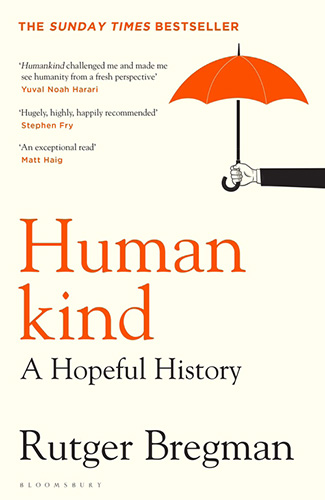The basic argument of this book is very simple. Contrary to the ‘persistent myth that by their very nature humans are selfish’, Dutch author Rutger Bregman argues that ‘most people, deep down, are pretty decent.’
The assumption of human selfishness underpins huge portions of mainstream political and economic thinking, including the influential veneer theory – ‘the notion that civilisation is nothing more than a thin veneer that will crack at the merest provocation’. Bregman believes the opposite to be true: ‘It’s when crisis hits… that we humans become our best selves.’
He considers the notion that humans are innately good to be a ‘radical idea’ with huge ramifications, because ‘to stand for human goodness is to take a stand against the powers that be’, for whom ‘a hopeful view of human nature is downright threatening.’
Framing the book as a personal journey of discovery, Bregman ranges far and wide to construct and prove his proposition. He engages with thinkers and ideas from archaeology, anthropology, biology, philosophy, psychology, sociology, politics and history. The book’s plentiful references are similarly diverse, and provide a great guide for those interested in going deeper into particular subjects.
There is much here that will interest peace activists, including a discussion of SLA Marshall’s claim that only a minority of US soldiers in combat in the Second World War fired their weapons at the enemy in any given encounter, a passage looking at the ineffective Allied bombing of civilian areas in Germany in the 1940s and an inspiring account of the 1914 Christmas Truce.
Bregman is particularly keen on slaying a number of sacred cows, including two famous social psychology experiments that seemed to prove human beings’ darker nature: Stanley Milgrim’s 1960s work on obedience to authority and Philip Zimbardo’s 1971 Stanford Prison Experiment.
Fittingly, the book ends by highlighting a number of hopeful initiatives from around the world that assume human beings want to do good, such as Universal Basic Income in Alaska, Norway’s progressive prison system and participatory budgeting in South America.
Bregman is a great storyteller, which makes for a really enjoyable and engaging read. Even though he approvingly quotes Bertrand Russell about not letting wishful thinking get in the way of the truth, the book is very much a polemic, with the nagging feeling of being guided down a particular path using carefully selected evidence and argument.
For example, while the many criticisms of Zimbardo’s work leads to Bregman dismissing the academic’s findings, when it comes to Marshall’s also heavily-criticised research, Bregman is happy to broadly accept his results, which happen to back up his argument.
But even if you aren’t completely persuaded by Bregman’s argument, Humankind is nevertheless a welcome rebalancing of the scales in the age-old ‘human nature’ debate in favour of co-operation, compassion and nonviolence – something that can only help peace activists and the struggle for a better world.


